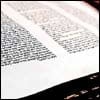My head was spinning, reeling from hours of exerted concentration.
We were a few hours into yet another knotty computer training session, necessary for my work here at Chabad.org.
This time it was my editor (and boss) at our headquarters in Brooklyn who was helping me via remote connection, from my home in Toronto, to learn what I considered a hopelessly complicated program. Either he was born actually enjoying this technical stuff or he was breezing through it due to his years of experience. I, on the other hand, was desperately lost, fumbling and tripping my way through all this complex technical jargon.
Here was my opportunity to finally put an end to the torment."How are you doing, Chana?" he finally asked. "Ready for more, or have you had enough for now?"
My eyes were blurry from the screen, my forehead, crumpled in concentration and my legs, cramped from hours in the same posture. Here was my opportunity to finally put an end to the torment—at least until the next session.
"How about we stop here and call it a day?" I meekly implored.
"Sounds like you're a little overwhelmed." He was astute. "How about I just show you one more really simple thing—how to 'pull text' from each article?"
His request sounded more like a statement than a question. So rolling my eyes, groaning inwardly and intuitively knowing that the task didn't sound simple at all, I attempted to sound more agreeable than I felt as I stoically muttered, "Ok, sure."
We plowed ahead. Being as technically-challenged as I am, simple computer tasks never amount to being simple. This, too, was no exception and after following his very precise instructions, I was still rewarded with the large red words crossing my screen spelling ERROR.
My instructor checked to see where I had gone wrong.
"Oh, there you are," he announced confidently. "Check the body of the document. Do you see your mistake?"
There are some very important things in life that have exacting, sensitive formulas to bring out their desired results.Though I checked and rechecked, it all looked fine—a mere hodge podge of letters and symbols.
"Look again. Do you see that extra symbol?" he asked. Sure enough, the deviant symbol was black-and-white evidence of my apparent crime. "This program is very sensitive," he explained. "Even an extra dot, an extra symbol or a missing one will cause an error and make it awry. It is very precise."
Honestly, I'm not really sure, nor do I think I ever will appreciate, why such a small deviation out of hundreds of letters can cause such a significant error. Nor do I think I will ever understand why it all needs to be so fixed. But then again, I'll be the first to admit that I'm no authority in these things and will just rely on the experts' directions.
But aside from a hefty headache, that training session did leave me with the realization that there are some very important things in life that are way beyond my comprehension but have exacting, sensitive formulas to bring out their desired results.
I'm often asked, just as often as I ask myself, why parts of Torah law need such precise formulas. Why should sixty seconds spell the difference between a prohibition of igniting the Shabbat candles rather than a positive deed bringing more light and holiness to our world? Why should a thread of linen in a wool garment make it unwearable? Or why can't a small sip of milk follow a hearty meaty meal? What difference does it really make?
But that computer session did show me the importance of all these meticulous instructions.
Because it is far more gratifying to create a nicely flowing document, than big red letters across your screen reading ERROR.
Now, if only I could remember all those detailed instructions…
Can you share a time in your life when something so small spelled the difference between being on track and causing a serious error?







